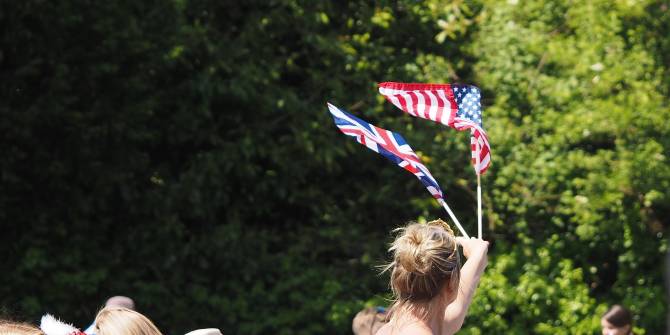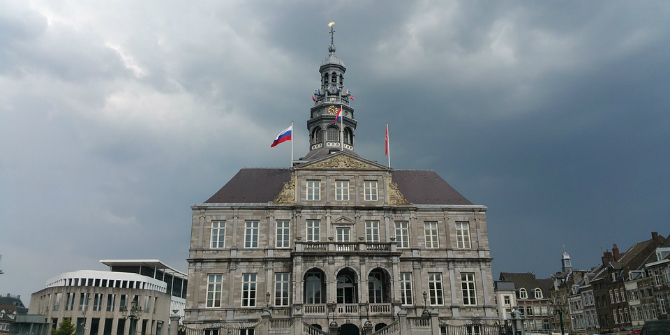What are the prospects for the US-UK trade talks – and are they just a distraction, anyway? Ros Taylor and Roch Dunin-Wąsowicz (LSE) round up the week’s Brexit news.
Now US-UK trade talks have begun, the government is negotiating post-Brexit trade on two fronts – as well as handling the matter of the COVID-19 pandemic.

These talks would normally be the focus of frenzied speculation and analysis. But these are not normal times. The LSE’s Thomas Sampson explains why, in his opinion, now was not the right time to start talks with the US – partly because the boost in GDP likely from a transatlantic deal is small (0.2%), but also because if the UK adopts US food standards, the EU will impose stricter controls on UK food imports. ‘Since more is at stake in EU talks, the UK should prioritise fixing its relations with the EU before negotiating with the US.’
UK-US trade talks begin today. I think it's a mistake for the UK to start negotiating with the US at this stage. Quick thread on why. 1/
— Thomas Sampson (@thom_sampson) May 5, 2020
‘Plenty of US food is illegal in the EU,’ points out David Henig:
A UK-US trade deal is all about the politics of Brexit, being of limited economic value. I suspect it will happen as Brexit doesn't really make sense without it, but there are others who think the price in terms of UK farmers is too high and it won't happen.
— David Henig (@DavidHenigUK) May 4, 2020
‘The US is our largest trading partner and increasing transatlantic trade can help our economies bounce back from the economic challenge posed by coronavirus,’ said Liz Truss.
How are the EU-UK talks going? The FT reports increasing tensions over emissions, with the UK refusing to guarantee to sign up to climate change commitments. Michel Barnier’s latest tweet was cagey. But the BBC’s Katya Adler says brinkmanship was always going to be part of the picture: ‘Should [we] be concerned right now? I’d say: not overly. Yet. There’s still time for agreement.’
For those worried about losing their jobs due to the pandemic, an alternative career may appeal: the government needs 50,000 people to fill in customs declarations. Michael Gove intends to set up a ‘customs agent academy’ to train them.
We reported suggestions last week that some Brexiters were keen for No Deal in the hope its effects would be smothered by the impact of the pandemic. Jennifer Merode of the Guardian looks at how far GDP is expected to fall in the UK and the eurozone:
The UK economy will see 8.3% contraction in 2020 and 6% increase in GDP in 2021 *but* 2021 forecast is modelled on the status quo, so could prove way out if UK leaves transition with no deal or thin deal.
EC say status quo purely "technical assumption" not prediction negs pic.twitter.com/HPTRBJjRv8
— Jennifer Rankin (@JenniferMerode) May 6, 2020
Is the EU Settlement Scheme delivering? Kuba Jabłonowski takes stock.
There are cracks in the EU Settlement Scheme – who will fall through them?
Susanne K Schmidt points out the constitutional differences between the UK and the EU:
That the slogan ‘take back control’ could find such resonance is rooted in the institutional mismatch between an EU that has constitutionalised and judicialised many policy choices, and the UK common law tradition that made the stark contrast with legitimacy rooted in parliamentary sovereignty so evident.
We rarely cover royalty on LSE Brexit, but Nathalie Weidrase of Bournemouth University has a chapter in a new book, Love Across the Atlantic: US-UK Romance in Popular Culture, which looks at what Meghan Markle has to do with Brexit. The ramifications of this special relationship are perhaps not something Liz Truss wants to dwell upon.
Finally, Otto English in Politico analyses the COVID-19 response as yet another example of British exceptionalism, whose “most notable triumph was, of course, Brexit.“







I have read this elsewhere. Trump sees the US economy tanking. He wants to go into the election showing that he is doing his best to revive the economy. The only possibility available within the given timescale is to produce a trade agreement with the UK. (A deal with anyone else would take longer because only the UK wishes things to move fast.) Given this situation the US is probably in a mindset to make realistic concessions to get a deal.
“But the BBC’s Katya Adler says brinkmanship was always going to be part of the picture.” …for EU negotiations.
With other issues dominating the headlines, the EU’s capability to strengthen its position by stimulating Guardian readers into panic mode is greatly diminished.
“Given this situation the US is probably in a mindset to make realistic concessions to get a deal.”
I have a bridge I want to sell you – please give me your contact details.